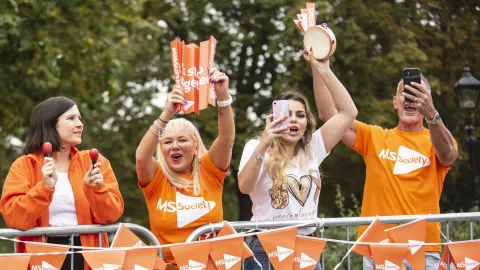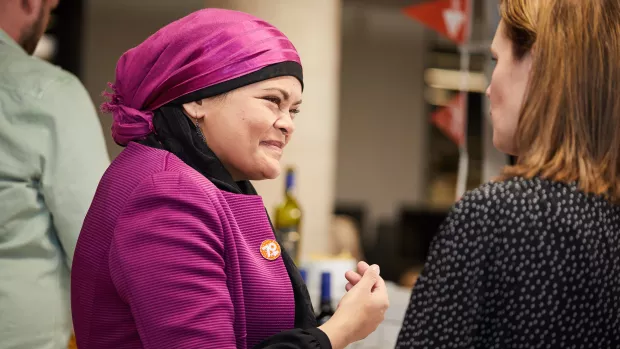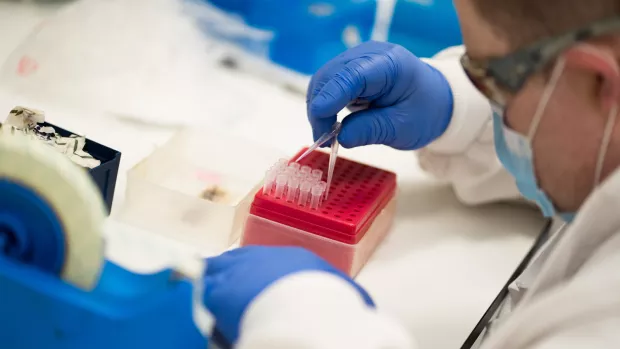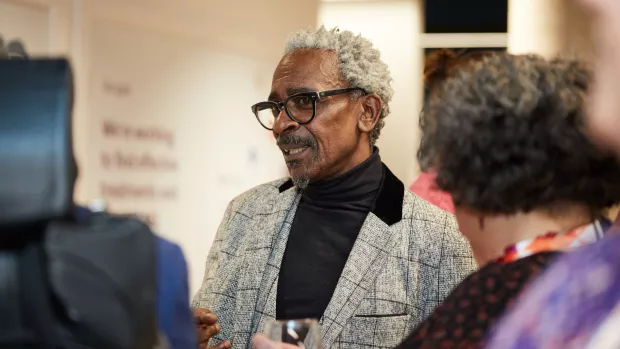
Our history
70 years of making a difference
In 1953, our founders Richard and Mary Cave were frustrated at the lack of treatments and support available for Mary's MS. So they decided to do something about it.
They set up their first meeting in West London, a small number of people came and the MS Society was born.
Today, we have around 30,000 members and groups in every part of the UK. Richard and Mary’s work has inspired thousands of volunteers, supporters and staff members to make a difference to the lives people affected by MS.
Find out about some of our highlights from the last 70 years.
50s | 60s | 70s | 80s | 90s | 2000s | 2010s | 2020s
1950s - The MS Society is born
1953 - Richard Cave hosts first ever meeting in Chelsea Town Hall, London.
1954 - Association of Scottish Branches (now local groups) formed.
1956 - First branches (now local groups) formed in Wales and Northern Ireland.
1958 - We establish Research Fellowship Scheme and commit £18,363 to MS Research.
1960s - Our first MS research appeal on the BBC
1960 - BBC hosts our first TV appeal.
1962 - Our ‘Welfare Services Spending’ reaches £63,000 to help support and care for people affected by MS.
1967 - Our membership tops 18,000 people.
1964 - The 100th MS Society branch is established.
1970s - 241 local groups support people with MS
1973 - Our research spending reaches £1,000,000.
1975 - By the mid 70s, we have 241 branches (now local groups) and over 30,000 members
1980s - We invest in the first MRI scanner for MS
1983 - We give £1 million research grant for the purchase of the first magnetic resonance imaging (MRI) scanner in the world to be solely dedicated to MS research. The scanner changed the way MS was diagnosed.
1988 - The European MS Platform is launched, to lobby, raise awareness, and provide information.
1990s - We launch the MS Helpline
1991 - We launched the MS Helpline, offering support and information to anyone affected by MS. We now deal with 28,000 enquiries a year and offer specialist support from legal and benefits advisers, MS nurses, physical activity specialists, and more.
1998 - Northern Ireland MS Society starts to build a new Resource Centre.
1998 - We fund the MS Tissue Bank, the largest distributor of MS brain and spinal cord tissue to MS research in Europe.
1999 - We launched the MS Nurses Programme to fund and develop much-needed MS nurse posts around the UK.
2000s: £7 million investment in MS research
2000 - We host the largest MS lobby in the UK Parliament, 'Ending the Lottery of Care'.
2002 - MS Society Essentials series is launched, responding to topics people with MS wanted information about. We now have a range of information resources.
2003 - We set up the Research Network to ensure people affected by MS shape the MS Society’s research programme.
2005 - We award £1,428,674 to set up the Cambridge Centre for Myelin Repair.
2007 - Launch of the Symptom Relief Research Initiative to raise awareness and fund research into symptom management for people with MS.
2008 - We invest over £7 million into new MS research – the largest investment to date.
2008 - Research investment includes over £2.5m in a state-of-the-art 3-Tesla MRI scanner at the National Hospital for Neurology and Neurosurgery in London. The scanner is dedicated solely to MS research.
2009 - We launch the first project into childhood MS in the UK in partnership with the children’s charity Action Medical Research.
2010s - Incredible research breakthroughs
2010 - We partner with UK Stem Cell Foundation to fund up to £1 million worth of stem cell research.
2010 - Research we funded leads to breakthrough showing that damage to myelin can be reversed using stem cells.
2011 - Research we funded into vitamin D shows a direct link between vitamin D and a gene linked with MS.
2011 - Launch of the first ever MS Register to measure the impact of MS.
2012 - Botox is licensed for the treatment of overactive bladder in MS. We funded early clinical trials of this symptom management treatment.
2013 - In partnership with the James Lind Alliance, we identify the top ten research priorities that matter most to people with MS.
2014 - Researchers we’ve funded announce finding that exercise can help beat MS fatigue.
2014 - Through the Progressive MS Alliance we help fund 22 research projects aimed at developing successful treatments for people with progressive MS.
2015 - We publish a new consensus on the importance of early treatment for relapsing forms of MS, which could transform life for thousands of people.
2015 - We launch MS SMART, a groundbreaking clinical trial to find treatments for secondary progressive MS.
2016 - We invest £5.7million in research, with £2.5 million going to projects looking for new effective treatments for MS.
2017 - We co-fund MS-Stat2, a study to confirm if simvastatin can slow or stop disability progression for people with secondary progressive MS. It’s the UK's largest ever trial for secondary progressive MS and will run until 2023.
2018 - With the MS community, we boldly call for medicinal cannabis to be available for people with MS who could benefit.
2018 - MS-SMART results are announced. They tell us a lot about the biological pathways in progressive MS, helping researchers rule out and prioritise other drugs for future trials.
2019 – We launch our ambitious Stop MS Appeal. Stop MS aims to raise £100 million to transform what it means to live with MS, for everyone with the condition.
2020s - Speeding up the development of treatments
2020 - We launch our new five-year strategy, Every MS Story. At its core are the MS stories of the 130,000 people living with MS in the UK, and their carers, family and friends.
2020 - In partnership with Bournemouth University, we launch our free online fatigue management course for people with MS.
2021 - We introduce Octopus, our revolutionary, multi-arm, multi-stage trial that will transform the way we test treatments for progressive MS.




